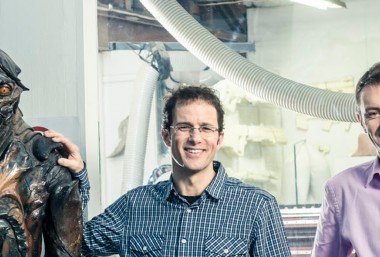When your reputation and bottom line could be destroyed by an unsuspecting breach of copyright, it’s not something you leave to chance.
Only those who have been hiding out in Smaug's cave for the last 500 years will fail to recognise the name Weta Workshop. The Wellington-based conceptual design and manufacturing facility has become synonymous with bringing fantasy worlds to life for the big screen.
Five-time Oscar winner Richard Taylor and his partner Tania Rodger started the company (originally called RT Effects) back in 1987. Seven years later, they joined up with Peter Jackson and Jamie Selkirk and Weta Workshop was born. It now provides conceptual design and produces specialist props, costumes, weapons, vehicles, makeup and prosthetics for the global entertainment industry.
Weta Workshop's credits include the Lord of the Rings trilogy, The Adventures of Tintin, Heavenly Creatures, Avatar, King Kong and The Hobbit. It also launched its own children's TV series: Jane and the Dragon.
Today international film studios and production companies seek Weta out for its ability to come up with original concepts and product designs. Guaranteeing the originality of its ideas is therefore crucial and Weta Workshop relies on the intellectual property specialists at AJ Park for expert advice and guidance in this area.
AJ Park partner Damian Broadley has worked closely with Greg Hunt, Weta's corporate services manager, for many years. One of his first tasks was to protect the Weta trade mark and associated brands, including a sister company called Pukeko Pictures, which produces The WotWots.
'Protecting their name was the first priority,' says Broadley. 'Like a lot of businesses in the creative space, Weta hadn't thought much about its own intellectual property at that time. We sorted that out and then moved on to reviewing their other trade marks, and looking at copyright and contractual issues.'
Broadley describes Weta Workshop as a bit of a 'copyright factory'. As such, it's vital that it understands the issues associated with what it produces. The big studios require very tight guarantees around work done for them, he says.
'It's what they do all day every day, but understandably, they're focused on their work, not on the legal side.'
'When Weta supplies designs or props to a film studio for a movie, it's crucial that these are original, and also that the concepts and details remain confidential. Infringing copyright would be disastrous for Weta - their reputation would be shot and they could be sued - so they take this kind of thing very seriously. Their designers are world-class original artists, but they still sometimes need some clarification on copyright issues.'
Greg Hunt admits it can be difficult to identify the fine line between being inspired by something and copying it.
'We have a big conceptual design team who work with film-makers to conceptualise a project,' he says. 'Most of it comes out of the imaginations of our designers, and the contracts we have with our clients state that our work will be original. It's very much a judgement call - there's no equation to calculate what is enough of a variation on something that already exists.'
The industry we're in is all about originality and intellectual property rights, so we look to AJ Park for advice on these matters. They have a good pragmatic approach and they coach our designers on what's original and what might breach copyright. If a project's taken several years and cost hundreds of millions of dollars, a studio doesn't want any IP issues. The first sniff of any lack of professionalism from us would be a huge blow to our credibility.
- Greg Hunt, Weta Workshop
Broadley also reviews Weta Workshop's contracts, so that everyone is clear about who owns the designs they produce, and where and how they can be used.
'Weta is a great client. Good people, and interesting projects. Mark Hargreaves, in our commercial team, has been working on a license agreement for them relating to some really cool technology we can't mention yet. It's never dull.'
He says some of the issues faced by Weta Workshop may also apply to other businesses involved in producing original designs, such as graphic and fashion designers, architects, photographers, ad agencies and computer-game creators.
'Many agencies create great original work in New Zealand and there are a lot of copyright issues associated with what they do,' says Broadley. 'Companies working in this area would be wise to make sure they're not infringing others or being infringed themselves; and anyone employing designers should have contracts that clearly stipulate who owns or can use the designs that are produced.'
Written by Deirdre Coleman, this case study was featured in issue #47 of Idealog. Photo courtesy of Mike Heydon.
